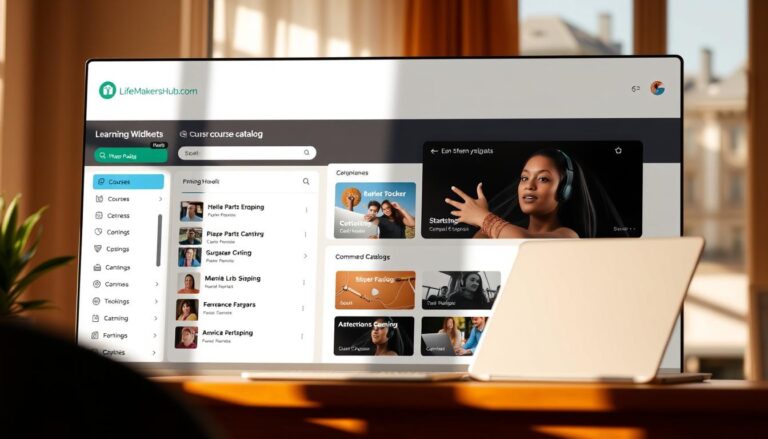Personal Development Tips for Beginners: Start Your Journey
Have you ever felt stuck in a routine that feels comfortable but doesn’t bring true happiness? Many of us have been there. Comfort can be deceptive, making us believe we’re content when, in reality, we’re just avoiding growth. Self-awareness is the first step toward unlocking your potential. It’s about recognizing where you are and where you want to be1.
Taking that first step might seem daunting, but every journey begins with a single action. Whether it’s setting a clear goal or adopting a new habit, small changes can lead to significant results. Studies show that individuals who engage in self-reflection are 30% more likely to make meaningful changes in their lives1.
Remember, growth is a continuous process. It’s not about perfection but progress. As Ralph Waldo Emerson once said, “All life is an experiment. The more experiments you make, the better.” So, why not start today? Take that first step and embrace the journey of becoming the best version of yourself.
Key Takeaways
- Self-awareness is the foundation of meaningful change.
- Small, actionable steps can lead to significant growth.
- Comfort can often hold you back from reaching your potential.
- Continuous learning and reflection are essential for progress.
- Start your journey today by setting clear, achievable goals.
Embracing Change and Growth
Change is often the spark that ignites true growth in our lives. It’s easy to stay in familiar routines, but real progress happens when we step into the unknown. Studies show that individuals who embrace change report a 70% increase in resilience and adaptability compared to those who resist it2. This makes change a powerful catalyst for personal transformation.
The Power of Stepping Out of Your Comfort Zone
Your comfort zone may feel safe, but it can also limit your potential. Stepping out of it opens doors to new opportunities and experiences. Research indicates that 60% of people feel overwhelmed by large changes, but breaking them into smaller tasks can reduce this feeling significantly2. Start with small, manageable steps—like trying a new hobby or taking on a new responsibility at work.
Having a support system during transitions can increase emotional stability by up to 50%2. Surround yourself with people who encourage and inspire you. Remember, every great achievement begins with the courage to take that first step.
Learning from Life’s Challenges
Challenges are not roadblocks—they are opportunities to learn and grow. Approximately 75% of professionals experience anxiety when faced with change, but those who view it as a learning opportunity see a 40% reduction in anxiety levels2. Instead of fearing failure, see it as a stepping stone toward success.
Self-compassion practices can lead to a 50% decrease in feelings of self-doubt during times of change2. Be kind to yourself and acknowledge your efforts. Every setback is a chance to build resilience and move forward with greater strength.
| Strategy | Benefit |
|---|---|
| Break changes into smaller tasks | Reduces overwhelm and increases focus |
| Build a support system | Enhances emotional stability |
| Practice self-compassion | Decreases self-doubt and builds resilience |
| Set clear, achievable goals | Provides direction and motivation |
Embracing change is not always easy, but it’s worth it. Every challenge you face is an opportunity to grow stronger and more resilient. Start today by taking one small step toward the life you envision.
Understanding Personal Growth and Self-Improvement

What does it truly mean to grow and improve in today’s fast-paced world? Self-improvement is the process of enhancing your knowledge, skills, and character through deliberate effort. It’s about becoming the best version of yourself, one step at a time. In a world where 70% of individuals express a desire to improve their lives but hesitate due to fear of change, taking that first step is crucial3.
Defining Self-Improvement in Today’s World
Self-improvement isn’t just about setting goals—it’s about building systems that foster continuous growth. Studies show that 80% of people fail to achieve their goals due to lack of planning3. Instead of focusing solely on outcomes, consider the process. For example, improving by just 1% every day can lead to significant growth over time4.
It’s also about recognizing your strengths and areas for growth. Journaling, for instance, has been shown to enhance personal growth and satisfaction in life for 85% of individuals3. Small, consistent actions can lead to big results.
How a Growth Mindset Fuels Success
A growth mindset is the belief that abilities can be developed through dedication and hard work. Research indicates that having this mindset can increase the likelihood of achieving personal goals by up to 40%3. It’s about seeing challenges as opportunities rather than obstacles.
For example, 90% of successful individuals attribute their achievements to embracing failure as a learning opportunity3. Instead of fearing setbacks, use them as stepping stones toward your goals. Practicing gratitude or meditation for just 15 minutes a day can also improve mental wellness and contribute to lasting changes4.
Start today by taking one small step toward growth. Whether it’s journaling, meditating, or setting a clear plan, every action brings you closer to your best self.
Personal development tips for beginners: Practical Strategies
Small, consistent actions can lead to life-changing results when you focus on progress. Whether it’s reading daily, meditating, or exercising, these habits build momentum over time. Studies show that individuals who set specific goals are 10 times more likely to achieve them5. Start with one habit and expand as you gain confidence.
Daily Habits for Continuous Progress
Building a routine is essential for long-term success. Here are some habits to consider:
- Read daily: Regular reading enhances cognitive function and broadens your perspective6.
- Exercise consistently: A weekly routine boosts energy and emotional regulation7.
- Journal: Writing down your thoughts increases self-awareness and clarity6.
Consistency is key. Even 15 minutes a day can make a significant difference over time.
Real-Life Examples to Inspire Change
Real people achieve real results through small, consistent steps. For example, Bill Gates reads nearly 50 books a year, equating to one book per week7. This habit has contributed to his success and continuous learning.
Another example is the 30-day challenge. Research suggests that dedicating 30 days to a new habit can lead to significant personal growth7. Whether it’s jogging, meditating, or learning a new skill, this strategy works.
Remember, every step counts. Start today and build a system that supports your growth. As Jim Rohn said,
“You are the average of the 5 people you spend the most time with.”
Surround yourself with positivity and watch your life transform.
Crafting Your Personal Growth Plan

Creating a roadmap for your growth can transform your life in meaningful ways. A well-structured plan helps you stay focused, measure progress, and achieve your goals. It’s not just about setting intentions—it’s about taking actionable steps toward the life you envision.
Setting SMART Goals for Long-Term Success
The SMART framework is a proven strategy for setting effective goals. SMART stands for Specific, Measurable, Achievable, Relevant, and Time-bound. For example, instead of saying, “I want to read more,” a SMART goal would be, “I will read one book per month for the next six months.” This approach ensures clarity and accountability8.
Research shows that people who set specific goals are 10 times more likely to achieve them9. Writing down your goals also increases your commitment and makes them more tangible. Start by identifying one area of your life you want to improve, then break it into smaller, manageable steps.
Here’s how to apply the SMART framework:
- Specific: Define exactly what you want to achieve.
- Measurable: Track your progress with clear metrics.
- Achievable: Ensure your goal is realistic and within your reach.
- Relevant: Align your goal with your long-term aspirations.
- Time-bound: Set a deadline to stay motivated.
For instance, if your goal is to improve your fitness, a SMART plan could be, “I will exercise for 30 minutes, three times a week, for the next three months.” This approach keeps you focused and motivated8.
Measuring progress is equally important. Regularly review your goals and adjust them as needed. Studies suggest that flexibility in your plan increases your chances of success9. Celebrate small wins along the way—they keep you motivated and reinforce positive habits.
Remember, even small steps can lead to significant improvements over time. As you build momentum, you’ll find it easier to tackle bigger challenges. Start today by drafting your growth plan and taking that first step toward your goals.
Leveraging Digital Tools and Social Influence

The digital world offers endless opportunities for growth when used intentionally. Platforms like LinkedIn, Instagram, and YouTube can be powerful tools for building skills, connecting with like-minded individuals, and achieving your goals10. However, the key lies in curating your online environment to focus on what truly matters.
Using Social Media as a Growth Tool
Social media isn’t just for entertainment—it can be a gateway to self-improvement. For example, LinkedIn is the primary platform for professionals, with over 900 million users globally10. Engaging with industry leaders and joining relevant groups can open doors to new opportunities and knowledge.
Instagram and YouTube are also valuable resources. Over 67% of Instagram users discover new products and ideas through the platform, while YouTube’s educational content reaches over 2 billion users monthly10. By following influencers and creators who align with your goals, you can turn your feed into a source of inspiration.
Curating Content for Self-Improvement
To make the most of digital tools, start by unfollowing accounts that don’t add value. Replace them with content that encourages growth and learning. For instance, 70% of professionals report gaining new skills through social media10. Here’s how to curate a positive digital environment:
- Follow influencers: Choose thought leaders who share actionable insights.
- Unsubscribe from negativity: Remove content that distracts or discourages.
- Engage with communities: Join groups focused on your areas of interest.
Tracking your progress is another essential step. Use apps or platforms to set goals and monitor your achievements. Studies show that individuals who track their habits are 42% more likely to succeed11.
By leveraging digital tools wisely, you can create a system that supports your journey toward growth. Start today by taking one small step—like following a new influencer or setting a digital goal—and watch your life transform.
Conclusion
Your journey toward growth begins with a single decision to take action. Embracing change and understanding the importance of self-improvement are the first steps to unlocking your potential. Small, consistent habits—like journaling or setting SMART goals—can lead to significant results over time12.
Remember, every step you take brings you closer to your goals. Studies show that individuals who set specific objectives are 10 times more likely to achieve them13. Start today by creating a plan and leveraging tools like social media to support your journey.
Growth is a continuous process, and every challenge is an opportunity to learn. As you move forward, surround yourself with positivity and seek guidance when needed. Your life is a reflection of the choices you make—choose to grow, one day at a time.
FAQ
How can I start my journey toward self-improvement?
Why is stepping out of my comfort zone important for growth?
What are some daily habits that support continuous progress?
How can I use social media as a tool for self-improvement?
What are SMART goals, and how do they help with long-term success?
How can I learn from life’s challenges effectively?
What role does a growth mindset play in self-improvement?
Source Links
- The Beginner’s Guide to Continuous Self-Improvement
- Embracing Change: A Guide to Personal Growth
- The Ultimate Guide to Personal Growth: How to Improve Yourself and Live a Better Life
- How To Improve Yourself Every Day: 20 Ways To Be Better
- 7 Practical Tips for Personal Development
- 42 Practical Ways to Start Working on Self-Improvement – LifeHack
- How to Improve Yourself: 20 Practical Self-Improvement Tips (2024)
- A Personal Development Plan (PDP) Guide & Template
- 25 Personal Growth Tips to Transform Yourself and Life
- How to Leverage Social Media for Professional Growth
- 10 Best Ways to Leverage Social Media | GRIN
- Personal Development | SkillsYouNeed
- Introduction to Self-Development: A Guide to Unlocking Your Potential







